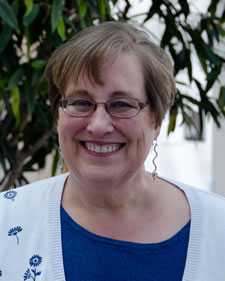CDC Women in STEM Careers - Sue Casteel, MS
Environmental Health Scientist
Division of Community Health Investigations, Agency for Toxic Substances and Disease Registry, CDC

Every autumn Sue Casteel’s elementary school in Arkansas closed for a few weeks so the children could pick cotton during harvest season. They used their bare hands. The work was hard; but to her as a child, it seemed like a fun game.
She became an environmental health scientist who does things like test creek water samples for bacteria. This helps protect public health by ensuring healthy drinking and recreational water, adequate sanitation, and improved hygiene.
She also is a health educator who helps inform and protect the public during and after disasters. For instance, after a flood she might tell people to make sure the electricity is turned off before they reenter their homes so they don’t shock themselves. And watch out for snakes in the water!
“The best part of my job,” Casteel says, “is helping people understand public health problems in their communities and finding ways to keep them safe.”
Ask Questions, Get Answers
As a child I always wanted to know why the grass was green, how birds could fly, and what made fireflies glow in the dark. My mother was a biochemist, meaning she studied the chemistry of living things. She answered all my questions and inspired me to get a degree in science.
I developed a love of art from my father, a minister, who helped me see the beauty in the grass, birds, and fireflies. In college I combined my two passions, majoring in science and taking art classes. I wanted to share beauty through a scientist’s eyes.
"I never know what challenges I will face each day. However, I do know I can make a real difference in people’s lives by talking to them, answering their questions, and calming their fears."
Helping People Survive Disasters
I have spent most of my career as an environmental health scientist and teacher at state and federal public health agencies. I do a lot of emergency response work. In 2011, a tornado hit Joplin, Missouri, killing about 160 people and destroying much of the town. We made plans for people going back to their homes to be sure they didn’t hurt themselves. If they had breathing problems, we told them not to go back in because they might inhale particles in the air that could make their breathing problems worse.
We talked to people who in many cases lost everything they had. We told them what to look out for when they went back home to find their possessions. For example, we told them to wear work boots with steel toes so they wouldn’t step on a nail and get tetanus disease.
After Hurricane Katrina in 2005, there was a huge oil spill on the Gulf Coast that damaged many homes. We told people to wear gloves to avoid getting oil on their skin. Several people came to the hospital with rashes caused by oil.
I worked in Omaha, Nebraska, for several years in an area polluted by a plant that worked with lead. Health workers had seen a high level of lead poisoning there. My job was to teach people the harm of being around lead and ways to protect themselves. When children play in the yard, they can swallow lead from the soil by putting their dirty hands or toys in their mouth. Studies show that high levels of lead in children cause behavior or learning problems.
I am also part of the team that developed the Don’t Mess With Mercury website. I am helping update the website, develop apps, and educational videos. It’s nice that even as a scientist I get to use and try different skills like creative writing, information technology, and visual arts to develop effective health education materials.
Advice to Girls and Young Women
- Really listen to people to understand what they need—don’t assume you know.
- Study what you love. Never, ever give up if the path gets too hard. You can reach all your goals if you believe in yourself and are willing to work hard.
- Set small goals you can achieve. There may be times when you feel stressed. It helps to remember a popular joke: “What’s the best way to eat an elephant? One bite at a time.” This refers to how you can approach a large task. I took graduate school classes “one bite at a time”—and now I have a job I enjoy that lets me help people and their loved ones stay healthy and safe.
- Page last reviewed: March 20, 2015
- Page last updated: March 20, 2015
- Content source:


 ShareCompartir
ShareCompartir